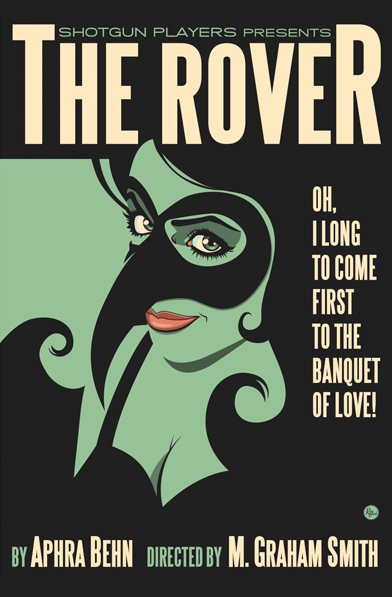|
"Racuous and side-splittingly funny." - Sarah Elizabeth Adler, The Daily Californian
"It's a fast, sharp farce with a nasty, vicious edge." - John Wilkins, KQED
"Delightful...clever and daring." - Eddie Reynolds, Talkin' Broadway
"A spry and delightful pastiche that conjures the full range of possibilities – from hilarious to severe." - Gerard Ramm, On the Scene
Topsy-turvy world of ‘The Rover’ delights audiences
Sarah Elizabeth Adler
10/26/15
The Daily Californian
The set of Shotgun Players’ “The Rover” is built ever so slightly askew. Sloping gently to one side, the tilted stage is the perfect nod to “The Rover’s” setting: 17th century Naples during the Carnival celebration, a time of masked revelry during which the seriousness of everyday life is set askance and replaced by a topsy-turvy world of wild indulgences. At Shotgun Players in Berkeley, playwright Aphra Behn’s 1677 comedy is given a rousing, rowdy staging that befits all the gaiety of Carnival while honoring the play’s more serious provocations around matters of sex, gender and the worth of women in a world ruled by men.
A playwright, poet and part-time spy, Behn is one of the best-known writers of the Restoration period and the first Englishwoman known to make her living as a professional playwright. England’s Restoration period, which began in 1660, marked the first time in which women — previously banned from performing on the Elizabethan stage — were allowed to take on theatrical roles. Shortly thereafter, the Restoration comedy — a genre known for its bawdiness and sexually explicit themes — was born.
“The Rover” fits squarely within the conventions of the Restoration comedy genre, but Behn’s genius lies in how she uses a backdrop of revelry, seduction and comedic exploits to explore themes such as the tension between matrimony and autonomy, expectations of sexual purity and the way in which female characters navigate a set of power dynamics that disadvantage them at almost every juncture.
Director M. Graham Smith’s production fully embraces Behn’s dualism. Shotgun Players’ “The Rover” is raucous and side-splittingly funny, but Smith takes care not to obscure Behn’s more serious themes — including several instances of attempted sexual violence — beneath a veil of humor. The play never once sags under the heft of its two and a half hour runtime, either. Instead, the production hums merrily along while weaving through its various densely layered subplots.
First, we’re introduced to sisters Hellena (Caitlyn Louchard) and Florinda (Siobhan Marie Doherty). Hellena, whom Louchard plays with captivating aplomb, is a delightfully mischievous sprite who pursues the roguish Willmore (Jeremy Kahn) in an attempt to avoid her brother Don Pedro’s (Dan Saski) plan to send her to a convent. Willmore, the play’s eponymous rover, is an English naval captain whose capacity to wreak total havoc is perhaps the only thing greater than his sexual appetite.
Much like her sister, Florinda hopes desperately to avoid the marriage her brother has planned for her by reuniting with her beloved Belvile (Alex Lydon), another Englishman who has traveled to Naples with Willmore. Belvile and Willmore are joined by the impish Blunt (Justin Gillman), who spends his time in Naples pursuing the courtesan Lucetta (Elissa Beth Stebbins) only to be deceived. Finally, another courtesan, the renowned Angelica Bianca (Lauren Spencer), is left heartbroken after a dalliance with Willmore, though Don Pedro, her longtime admirer, attempts to win her affections.
All comedies — and perhaps especially ones as old as “The Rover” — depend on the sheer energetic force of their performers to truly succeed. “The Rover” hits that mark and exceeds it several times over. Each member of the cast puts forth a fully formed, captivating character — no easy feat when working with comedic stock characters that are several hundred years old. At the level of dialogue, too, the cast succeeds tremendously. Though Behn’s language may not be quite as challenging to the modern ear as that of a Shakespearean comedy, 17th century wordplay is still somewhat difficult. Each actor handles the dialogue clearly enough for comfort while preserving the richness and rhythm of Behn’s register.
In all, the cast of Shotgun Players’ “The Rover” make Behn’s work a comic delight fit for the modern age. Carnival, as Behn reminds us, is a time to indulge appetites of all kinds. Any audience hungering for the delights that “The Rover” has to offer will surely be left more than satisfied.
Shotgun Players' production of Aphra Behn's The Rover
John Wilkins
10/30/15
KQED
Real fear also courses through the Shotgun Players’ production of Aphra Behn’s Restoration comedy, The Rover. Set in Naples during carnival season, it’s a fast, sharp farce with a nasty, vicious edge, dexterously directed by M. Graham Smith with a brilliant sound design by Theodore J.H. Hulsker. At times it’s hard to tell what brings the characters more pleasure: love or inflicting pain. It’s a toss up for the audience, too.
Well, come on, not really.
We might root for the central couple, good Florinda and her steadfast Captain Belvile. But it’s the rover, Captain Wilmore, who intrigues. And not just us, but also Florinda’s sister, Hellena, scrapping life in the convent for a different kind of God. That this God’s a sick dick — that he mistakenly tries to rape his good friend’s fiancée, seduces a wily and experienced courtesan to the point of despair, and whose only redeeming feature is an animal’s ability to survive — well, that’s the type of joy you get in Restoration Comedy. But what a pleasure Wilmore the rover is, and JeremyKahn’s performance catches this demi-god in all his sleazy wonder.
In its season of women playwrights, Shotgun seems concerned with selling Behn’s feminist credentials, and she was a woman ahead of her time. But she was also an artist of her time and the Restoration playwrights (Behn, Congreve, Sheridan, Farquhar) understood that most people are corrupt. And so she comes to a disturbing conclusion about joy: In Behn’s world, you must learn to forget every kind of injustice if you want any kind of happiness. That’s joy with an undertow, which is where it belongs, submerged and gasping for air.
Review: The Rover
Eddie Reynolds
10/28/15
Talkin' Broadway
Chase scenes in and out of dark exits, a constant deluge of sexually-rich double entendres, young men and women ridiculously fawning over each other, body falls and flips, and pompous sword fights full of hot air and bravado: All are proper ingredients for a staged comedy ready for an audience's many guffaws. But what if added to the same comedic mix are young men roaming the streets looking for a lone woman to pounce upon, prostitutes as the only women allowed any real freedoms, and three attempted rapes by guys who appear on the surface to be quite fun and likeable? Throw into the mix that such a double-edged comedy was actually written in Restoration England's 1670s by the world's first woman to make her living as a playwright.
In a post-Oliver-Cromwell decade when theatres were rebuilding their burned-out structures, regrouping acting troupes, and looking to silly comedies with stock characters to re-attract a theatre-starved audience, Aphra Behn dared to emerge as a dominant female playwright. She did so by luring her audiences through bawdy jokes also to contemplate society's treatment of its female half. Shotgun Players presents an almost 350-year-old The Rover with its still-relevant themes of women being too often placed into stereotyped roles, forced to fight to have an equal voice and place in the world around them, and subjected to violence just because they are female. Shotgun Players and Aphra Behn ensure these points are made while still keeping us as audience constantly in stitches laughing.
As the street hurrahs and music of parading Carnivale revelers seep into a Naples home of the 1670s, two sisters plot how to escape a father and brother's plan of an unwanted marriage for one and a nunnery for the other. The sisters' plan is instead to escape masked into the riotous streets for a night of anonymous and forbidden exploration. Florinda pines for a soldier she recently met and hopes to find this night in order to plan an elopement. Her fast-talking, younger sister Hellena may be destined-to-be-nun but is tonight determined to grab a man, any man, cute enough and ready enough for a bedroom romp and her deflowering. As they sneak into the streets, three young pals also arrive in Naples looking for a night of drinking and debauchery, all the time plummeting each other with sex-filled one-liners and innuendoes.
Belvile, back from a military siege where he met a maiden who captured his heart (Florinda), fights bravely, barely resisting, the alluring tempts of the happy-go-lucky and roguish Willmore and their foppish friend Blunt to visit local brothels or to mate with a passing gypsy or two. Wanderings of the two sisters and the three buds, now all masked, lead to surprise meetings and wrong assumptions, sincere and false declarations of love, encounters with the lowest and highest of women of the night as well as jilts and jinks of all sorts. But jovial and too-drunken pursuits of lust also turn into forced attentions where not wanted, resulting in men too willing to use physical force over women who have dared to meet them on too-equal, too-clever grounds. In the end, after more disguises, desperate back-alley pursuits, and too-near disasters, these women all do take control of their destinies in ways that shock, shame, and subdue the males around them.
Siobhan Marie Doherty is the blonde and beautiful Florinda who swoons at the thought or sight of her Belvile and who also is brimming with the excitement of losing herself in the streets of Naples away from the controlling males of her family. She brings to Florinda just the right mixture of coquettish swish and twist along with firm determination to steer her own destiny. Caitlyn Louchard is delightful as the fast-chattering Hellena who is oh-so-eager to toss her nun's white lace for the slinky, black-lace stockings and too-short skirt of a girl on a mission to find love. Her Helena is clever, daring, and always able to draw audience laughs as she out-sneaks and outsmarts both the sleazy and the sexy man she seeks.
Also breaking out of societal boundaries is Angelica Bianca, a courtesan who commands high payoffs for her treats and who finds she has a heart open for love. Lauren Spencer plays with great skills the high and mighty side of this woman of the night; the sudden vulnerability of her finding unexpected attraction with a male visitor; and the fierce, eye-piercing look of revenge when she finds herself spurned. Loyally serving her is the hilarious Moretta, a pipsqueak, bent-over maid who guards like a hawk both Angelica and her potentiality for high payoffs. Elissa Beth Stebbins surprises more than one audience member in the curtain call when there are realizations that she somehow changed multiple times both costume and persona to play a super-sexy, dangerously devious prostitute, Lucetta.
As Willmore, the rover of this play by the same name, Jeremy Kahn steps into a stock character role of Restoration Theatre calling for a handsome, lovable lad devilishly to use all his wits and fun-loving manners to seek as much sex as possible, with maybe a little romance thrown in, by whatever stunts and silliness necessary. But as Afra Behn's rover, there is also a dark, mean, dangerous side of Willmore that keeps popping up, only then to hide once again behind the attractive, floppy-haired guy we as audience really want to like. Mr. Kahn brilliantly flips from one to the other of these two sides, leaving just enough room in the better part of himself for us to accept his eventual coming of senses to fall in love with the woman who has somehow believed in him all along.
Justin Gillman is Blunt, a fop in bright red bow tie and silly hat befitting a clown, who too often seems to be trying too hard to be funny. Mr. Gillman goes through all the right motions to be a silly wimp seeking his first-time sex, and sometimes he succeeds in capturing the excessive affectations of this dandy. However, too many of his antics seem to be like a joke line that just missed its timing or tone to draw the laughs intended. Even when he turns into a more vicious Blunt to lash out in an attempted rape, the moves and motions seem too stilted and forced to be either believable or farcical.
Alex Lydon as the suave, ever-faithful Belvile and Dan Saski as the controlling brother Don Pedro, who has his own shady side, are mildly noticeable in their roles but neither script nor their portrayals allow much lasting impression. (Mr. Saski is appropriately wicked and foul in brief appearances as a shirtless, slinking pimp.)
Truly starring in this production is costume designer Christine Crook, whose mostly red, black and white costumes of lace, feathers, and chiffon highlight sex, farce, romance, control, and evil all in just the right ways and places. The well-timed and realistic sound effects of Theodore J.H. Hulsker; the effective lighting of Heather Basarab; and Maya Linke's simple, bi-level, skeletal set with its central framed box (ready to be doorway or closet of escape) round out effects that help give this period piece a modern-day feel to go along with its still-relevant themes and messages.
Shotgun Players boldly brings a pioneering playwright's play of yesteryear to a 21st century audience where we discover her writing about our own current issues of sexual assaults against college coeds, difficulties of women to be given deserved equality in the workplace, and gender-based stereotypes that still stubbornly linger on every corner of society. The Rover is much less an amusing antique than a reminder that there is still much work to be done.
Review of Aphra Behn’s The Rover at the Ashby Stage
Gerard Ramm
10/28/15
On the Scene
The first thing one notices on entering The Shotgun Players’ production of The Rover is a 12-foot-high, rusted, iron altarpiece in the center of the stage, blending the industrial severity of a Richard Sera sculpture with the visceral form of a molar tooth. This piece stands on a blunt-gray wood, octagonal thrust, buttressed by steel scaffolding and bathed in a frigid blue light. Against this background, one might expect a staunch, minimalist interpretation of Aphra Behn’s 1677 play about disguise, defamation, and debauchery.
What one receives, instead, is a spry and delightful pastiche that conjures the full range of possibilities – from hilarious to severe – of The Rover’s Carnival. M. Graham Smith and his fantastic collaborators have managed a production that ventures from Restoration drama to harlequin romance to burlesque show to acid-jazz odyssey to Benny Hill to David Lynch that never obscures clarity of character or coherence of plot. More than that, this production deploys its fluid genres as a means of representing Aphra Behn’s social commentary and its stakes for our present moment.
One might configure The Rover’s plot around different episodes of coercion. Don Pedro (Dan Saski) coerces his sister Florinda (Siobhan Marie Doherty in an ardent, adept performance) to marry his preferred suitor Don Antonio over her love, the English soldier Belvile (Alex Lydon). This sets off Florinda’s attempt at uniting with Belvile before the marriage must take place. Meanwhile, Willmore (a wonderful, boisterous Jeremy Kahn), the English “rover” of the play’s title, attends a raucous Carnival in an attempt to coerce a number of different female attendees into sex, including the courtesan Angelica Bianca (Lauren Spencer). Blunt (Justin Gillman), the third English carnival-goer, finds himself coerced into a dark bedroom by an enigmatic sex-worker, Lucetta (Elissa Beth Stebbins), who denudes and robs him, leaving him in a state of vengeful aggravation.
The production recasts these moments of coercion with ominous light and sound cues that aptly link the many ways by which men deprive women of their consent (authority, deception, force). But the production does not simply rehearse a common narrative of female victimhood. The women in this play pronounce Behn’s language with a vituperative sarcasm and raw power that matches (and often dwarfs) their male pursuers. Likewise, the male actors deftly perform their lapses in power, failures of strength and impotence of wit. Their performances effectively expose the shallow jokes, phallic obsessions, and misogynistic slurs that constitute the boy’s club founded in Behn’s time and active today.
All of the performances here are uniquely strong, but it’s the three female leads – Spencer, Doherty, and Caitlyn Louchard who plays Florinda’s savvy sister Hellena – who merit praise in the final act. Without revealing too much to the unfamiliar, the putative reconciliation of the male aggressors with their female counterparts takes place through profound expressions of agency from each actress. Spencer, Doherty, and Louchard – each confronting the male cohort in her own way – handle Behn’s attempt at resolution with an emotional candor that does justice to the vital subject matter on display. Without a trace of contradiction, these actors expertly inhabit the fraught terrain of desire, which can veer from rollicking carnival to industrial wasteland with a step in any direction.
|
















